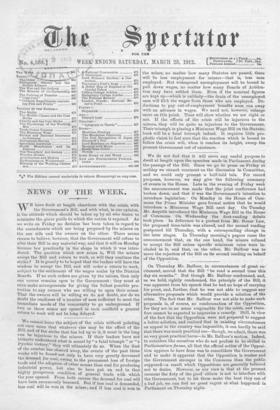We cannot leave the subject of the crisis without pointing
cut once more that whatever else may be the effect of the Bill, and of the strike that has led up to it, it must in the long run be injurious to the miners. If their leaders have not hitherto understood what is meant by "a fatal triumph " or "a Pyrrhic victory," they will ultimately do so. When the dust of the combat has cleared away, the events of the past three weeks will be found not only to have very greatly decreased the demand for-coal, owing to the permanent loss of foreign trade and the adoption of other means than coal for producing industrial power, but also to have put an end to that highly prosperous condition of general trade with which the year opened. From both causes the demand for coal will have been enormously lessened. But if less coal is demanded, less coal will be won in the mines; and if less coal is won in Parliament on Thursday night. the mines, no matter how many Statutes are passed, there will he less employment for miners—that is, less men employed. But widespread unemployment will be bound to pull down wages, no matter how many Boards of Arbitra- tion may have settled them. Even if the nominal figures are kept up—which is unlikely—the drain of the unemployed men will filch the wages from those who are employed. De- ductions to pay out-of-employment benefits soon run away with an advance in wages. We need not, however, enlarge more on this point. Time will show whether we are right or not. If the effects of the crisis will be injurious to the miners, they will be quite as injurious to the Government. Their triumph in placing a Minimum Wage Bill on the Statute- book will be a fatal triumph indeed. It requires little pro- phetic vision to feel sure that the reaction which is bound to follow the crisis will, when it reaches its height, sweep the present Government out of existence.






































